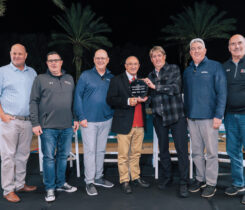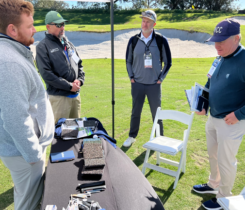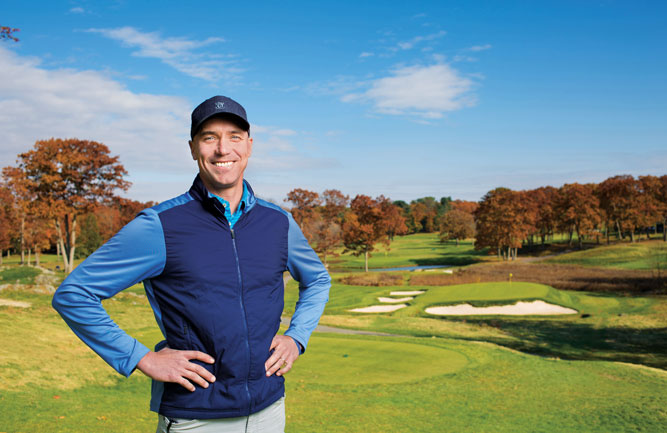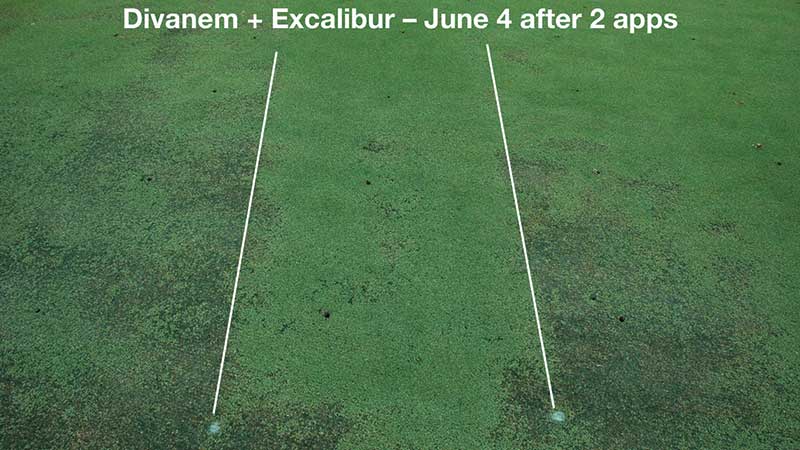Summarizing the Summit
Last month we recapped the discussions that eight different Golfdom Summit partners had with superintendent attendees. Those companies were Bluebird Turf Products, FairwayiQ, FMC Professional Solutions, Sipcam Agro, Smithco, Textron, Turfco and Nufarm.
Next month we will conclude our recap of the Summit with profiles of The Andersons, Capillary Concrete, Cub Cadet, Intelligro and Quali-Pro. Superintendents interested in attending future Golfdom Summits can apply at GolfdomSummit.com.
Winfield United
What do dairy and butter have to do with Winfield United, a crop input services company? Well, not a whole lot, but believe it or not, the company is owned by Land O’Lakes. Heavy cream, though, was not on the menu for superintendents at the Golfdom Summit.
Winfield has a three-pronged value proposition for superintendents, said Aaron Johnsen, Midwest regional director and national tech services director for Winfield. The first of those is service, the second is solutions and the third is insights, the focus of the company during the Summit.
The company has a suite of tools designed not necessarily for its products, but to help superintendents understand their courses, what they’re doing and how to do it better.
Winfield also works to be an innovator in the industry, Johnsen explained to attendees. It has a research facility in western Wisconsin where an agronomy staff tests products and how they work in various environments.
The company pairs with manufacturers it supports and adds to its portfolio that way. It focuses on adjuvants, plant nutrition products and wetting agents, Johnson said. Winfield also partners with vendors and has an early order program supers can participate in.
GeoTech, another focus of the company during the Summit, allows supers to map data on their courses. It also has a scouting aspect and can be programmed so supers can write prescriptions in the tool.
Healthy Grow
Healthy Grow, an organic product made from chicken litter and other organic materials, is manufactured by Pearl Valley Farms. Founded in 1987, the family-owned company has three locations in Illinois and about 2 million egg-laying chickens in production.
“It’s a nice, small company that does some really big things,” said Jeff Leuzinger, sales manager of Healthy Grow. “Our core business is eggs, and then we handle the back end of things,” Leuzinger joked to Golfdom Summit attendees, referring to the 500 tons of manure that Pearl Valley Farms composts and processes each week for Healthy Grow products.
The result, Leuzinger said, is two grades of fertilizer: one for greens and one for fairways. The products are created through an aerobic, indoor air-drying compost process.
“What we’ve done for the last 31 years is refine the composting process to get it clean and consistent,” Leuzinger said. “Also, our compost has incredible fungal and bacterial activity.”
He added that Healthy Grow has undergone several soil analyses within the past few years, which found that the product has helped improve turf quality in a variety of applications. For example, according to Leuzinger, Healthy Grow has helped with snow mold issues in the Midwest when applied in late fall. It also can assist in getting sand-based soil systems in Florida to percolate.
“The compost is really able to break down that organic matter,” Leuzinger said.
PBI-Gordon
For this year’s Summit, PBI-Gordon began with an introduction to the company, which began in 1947 as Private Brands Inc. and became one of the first companies to recognize the need for turf solutions designed specifically for golf course
superintendents.
Golfdom and PBI-Gordon go way back, and Golfdom received a special shoutout in the company’s presentation: The first advertisement for its broadleaf herbicide Trimec ran in the February 1970 issue of the magazine.
In the one-on-one meetings, PBI-Gordon reps wanted to take a more tailored approach to their discussions with superintendents.
“We were trying to avoid ‘selling’ to them,” said Jim Goodrich, product manager, fungicides and insecticides. “We wanted to have more of a conversation about what problems they were encountering on their golf courses and helping them with solutions for those problems.”
The ongoing labor shortage was a frequent topic. To cut back on labor needs and costs, many courses have added more native areas. More native areas have led to more issues with grassy and broadleaf weeds, including Queen Anne’s lace in the North and Japanese switchgrass in the South.
Superintendents also raised concerns about the diseases they saw this year, including dollar spot and Pythium root rot.
“A lot of guys are coming up against Pythium root rot in every part of the country,” Goodrich said. “We kept hearing that guys are thankful for our Segway product — it was resounding; a lot of guys were really pleased with the way Segway has performed for them. We’ve done a lot of work over the past couple of years to get Pythium root rot on our label. We’ve constantly been tweaking our label to include that language.”
PondHawk
If there was an award for the most prepared company at the 2018 Summit, PondHawk would be a strong contender for first place. As soon as superintendents entered the room and sat down with Sandra Burton, president and CEO, and Craig Burton, COO, they were presented with aerial photos — of their own courses.
“We did quite a bit of homework and had a good idea of what the water assets were at each course,” Sandra Burton said. “That allowed us the opportunity to get site-specific with each attendee’s water assets.”
PondHawk is a fully integrated solar-powered pond aeration system that delivers algae-eliminating bubbles to any pond without the expense of wiring for electricity.
“(Superintendent attendees) were like, ‘Wow, we’ve been waiting for something like this,’” Burton said. “The guys who have put electricity in all over their course are interested in the energy savings. And the others (without electricity) are looking at us as a first line of defense … energy delivery to the back nine can be cost-prohibitive. By being able to deliver pond aeration via solar power, we offset a lot of costs.”
When asked if there was one meeting that stood out, Burton recalled the excitement one superintendent had when he learned about the solar-powered technology.
“He immediately understood the value because he had already priced out installing electric at his course,” Burton said. “This was going to save his course thousands. Boom! He placed an order right there.”
Frost Inc.
In its third year as a partner at the Golfdom Summit, Frost was all about showing off its GPS-guided spray equipment.
“This technology has become more reliable … making you more efficient with your chemical applications because you’re not creating big triangles of overlap or underlap,” said Ken Rost, president and CEO of Frost. “You’re able to get more done faster because the operator is not making judgments about turning on and off boom sections. It’s all done autonomously through GPS guidance.”
Rost adds that Frost’s systems incorporate dual nozzles, one for slower speeds, one for faster speeds. To achieve top speeds, both nozzles activate together.
In addition to installing GPS spray control systems on new or used sprayers, the company has recently paired up with Kubota to offer the Ninja GPS spray control system on the Kubota RTV-X1140 vehicle platform.
The RTV features a Kubota diesel engine, hydrostatic transmission with high and low range, four-wheel drive and all-wheel independent suspension. The sprayer carries 200 gallons and has a 15-gallon clean-water-rinse system.
Additionally, Rost said, the machine allows the operator to travel at speeds up to 12 mph when spraying and up to 25 mph when traveling from site to site.
“I hear what you all are saying in your heads,” Rost said to Summit attendees. “‘You’re not going to drive 10 to 12 mph on my golf course.’ But the star of this piece of equipment is four-wheel independent suspension. It’s the smoothest and quietest sprayer I’ve ever been on.”
Pogo Turf
“(Pogo) stands for ‘poke and go,’ but it’s not really a tool, it’s a system of analysis,” explained Carmen Magro, vice president nd chief agronomist at Pogo Turf Pro, to attendees of the Golfdom Summit.
Pogo is a division of Portland, Ore.-based Stevens Water Monitoring Systems.
The system gives superintendents an in-depth analysis of various measurements they can take on their courses. The sensor measures things such as moisture, salinity, surface temperature and soil temperature, among others. Most important, Magro said to attendees, the tool allows supers to see how turf responds to watering and fertilizing.
“We all know there’s a perfect soil out there that has just the right amount of water and just the right amount of air, but nobody really knows what that is,” Magro said. “I assure you, it’s nothing related to what they teach you out of a textbook. It’s more related to how your turf responds to what you do.”
The Pogo system allows supers to understand how trends impact the way turfgrass performs over time. The sensor on the Pogo is a probe implemented exclusively by the U.S. Department of Agriculture and has even been used on Mars.
The system has allowed supers to see black layer develop before it appears. It also has helped clarify the correlation between watering cycles and fairy ring. The system also allows supers to map their courses, including sprinkler heads and cup placement.
It’s not a tool, Magro emphasized, it’s a system.
Steiner
Visibility and versatility. Those are the two V’s that drive the design of Steiner’s tractors and attachments, Michael Slattery, director of product management, explained to Summit attendees. Slope capabilities and low ground disturbance make Steiner products ideal for golf applications, Slattery added.
The tractors have an oscillating and articulated-steering frame, which decreases ground pressure and increases maneuverability without creating disturbance. The hydraulic weight transfer feature shifts weight off of the attachment back onto the front tires without the operator having to stop the machine.
Attendees took a look at the slope capabilities of the 450 DX tractor and learned that it could operate on a 30-degree slope. The flex deck has four decks as opposed to three, has an 80-inch cut and comes with a high lift blade and a side discharge.
Adjustments are easy, explained Slattery. A lever on the front of the attachment raises and lowers tension to change the belts and raises and lowers the deck, reducing trips back to the shop to grab hand tools to do the job.












